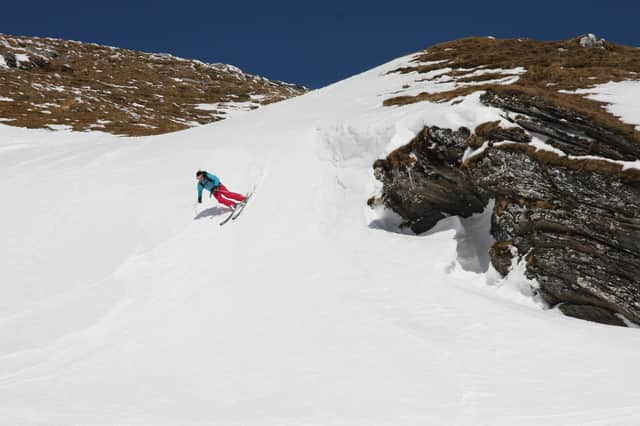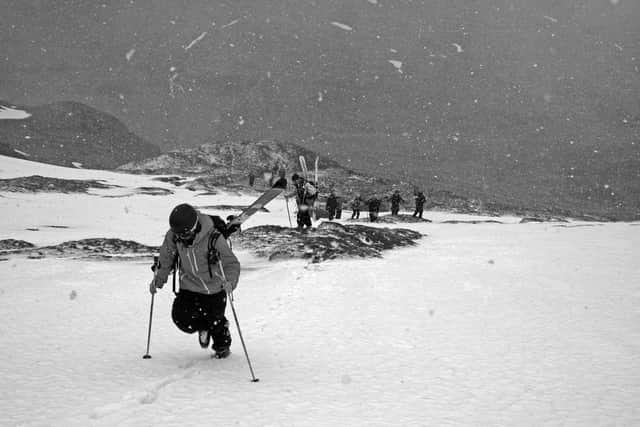Could this be the year backcountry skiing takes off in Scotland?


The arrival of various and variously effective Covid-19 vaccines will undoubtedly be positive for the Scottish ski industry in the long-term, but the Big Pharma cavalry may have arrived too late to make much difference to the 2020/21 ski season. Opinions about when things will return to normal still vary, but not even the most optimistic observers believe we'll all be vaxxed-up and ready to party by January, February or even March.
It wasn’t a huge surprise, then, a few weeks back, when the Nevis Range ski centre announced it would not be opening for the start of the coming season.
Advertisement
Hide AdAdvertisement
Hide Ad"Like many other Lochaber businesses," read the statement on the Nevis website, "we have been reflecting on the current situation with Covid-19 and unfortunately we have reached the very difficult conclusion to suspend the sale of season tickets for snowsports and temporarily close the business. Due to the incredible challenges we have faced this year (our trading loss due to Covid-19 was £1m) we are concerned that while there are restrictions in place, we simply would not be able to trade in December and January without losing significant amounts of money, which would put jobs at risk. We can’t wait to be back open and as soon as we have great conditions and less travel restrictions, we will be back out on the hill with you all."


At time of writing, Scotland's four other ski areas – Cairngorm, Glencoe, Glenshee and the Lecht – all seem to be gearing up to open as soon as there's enough snow. If they do decide to trade as normal through the winter, though, how they fare will hinge largely on what kind of travel restrictions are in place in the Central Belt – home to a large chunk of their customer base – and to a lesser extent on what restrictions are like in the rest of the UK.
One thing's for certain: backcountry skiing and snowboarding, which has already seen a spike in popularity in Scotland over the last ten years or so – is likely to be a major growth area in the winter ahead. For those who are shielding due to underlying health conditions, it probably represents the only realistic way of getting some snow-sliding done this winter, and while the ski centres are evidently doing everything they can to make their operations covid-friendly, there will still be those who might decide that, on balance, they'd rather head into the hills under their own steam.
For Iain Ramsay-Clapham, Snowsport Scotland's national development manager and organiser of the annual Scottish Freedom Series of freeride ski and snowboard events, the coming winter represents a good opportunity to get more people out into the backcountry, but he says it's important to do so in a responsible way.
"Backcountry skiing and snowboarding are fantastic for health, wellbeing and exercise," he says, "and if you're a lover of skiing on piste, what a great way to tick all those boxes while avoiding the crowds at the resorts. But, of course, there are so many caveats. Let's say you and I as complete newbies at backcountry skiing arrive somewhere in our car, pull out our shiny new unused skins, stumble around a bit and go 'look at that big pile of snow up there!' Have we done all our research? Do we understand the risks of going into areas where there are accumulations of windblown snow?"In order to look at ways of promoting backcountry skiing in Scotland while simultaneously making people aware of the dangers, Ramsay-Clapham and his colleagues at Snowsport Scotland have set up a steering group, with the goal of producing a series of webinars aimed at anyone interested in making their first serious forays off-piste.
"We've concluded that the role of the governing body from the point of view of backcountry skiing and snowboarding should be to draw people to that space," he says. "It's never been heavily promoted by a governing body before, so I think that's a fairly key part for us to play – and then what comes off the back of that is the need for education, looking at ways to promote safe activity in the backcountry."
As things stand, this year's Scottish Freedom Series is still scheduled to go ahead in February and March, with competitions in the Ben Lawers Range, at Nevis Range and at Glencoe. Obviously the closure of the Nevis Range ski area has put the Nevis event in doubt, but Ramsay-Clapham's take is nothing ventured, nothing gained.
"My view is that if you don't put dates in the diary, then if the restrictions are lifted we have nothing organised, whereas if we leave it as scheduled, where's the harm in that?”
Advertisement
Hide AdAdvertisement
Hide AdFor more information on the Scottish Freedom Series, visit https://www.scottishfreedomseries.co.uk/
A message from the Editor:
Thank you for reading this story on our website. While I have your attention, I also have an important request to make of you.
The dramatic events of 2020 are having a major impact on many of our advertisers - and consequently the revenue we receive. We are now more reliant than ever on you taking out a digital subscription to support our journalism.
To subscribe to scotsman.com and enjoy unlimited access to Scottish news and information online and on our app, visit https://www.scotsman.com/subscriptions
Joy Yates, Editorial Director